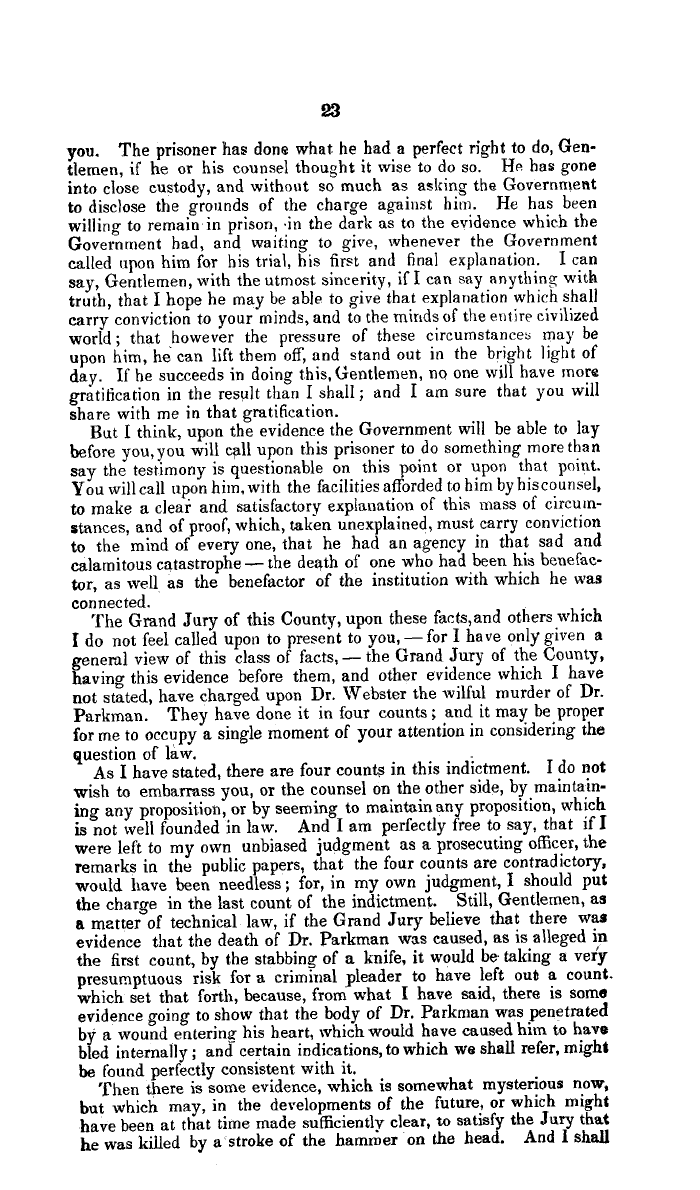|
23
you. The prisoner has done what he had a perfect right to do, Gen-
tlemen, if he or his counsel thought it wise to do so. He has gone
into close custody, and without so much as asking the Government
to disclose the grounds of the charge against him. He has been
willing to remain in prison, -in the dark as to the evidence which the
Government bad, and waiting to give, whenever the Government
called upon him for his trial, his first and final explanation. I can
say, Gentlemen, with the utmost sincerity, if I can say anything with
truth, that I hope he may be able to give that explanation which shall
carry conviction to your minds, and to the minds of the entire civilized
world ; that however the pressure of these circumstanceti may be
upon him, he can lift them off, and stand out in the bright light of
day. If he succeeds in doing this, Gentlemen, no one will have more
gratification in the result than I shall; and I am sure that you will
share with me in that gratification.
But I think, upon the evidence the Government will be able to lay
before you, you will call upon this prisoner to do something more than
say the testimony is questionable on this point or upon that point.
You will call upon him, with the facilities afforded to him by his counsel,
to make a clear and satisfactory explanation of this mass of circum-
stances, and of proof, which, taken unexplained, must carry conviction
to the mind of every one, that he had an agency in that sad and
calamitous catastrophe-the death of one who had been his benefac-
tor, as well as the benefactor of the institution with which he was
connected.
The Grand Jury of this County, upon these facts,and others which
I do not feel called upon to present to you,-for I have only given a
general view of this class of facts, - the Grand Jury of the County,
having this evidence before them, and other evidence which I have
not stated, have charged upon Dr. Webster the wilful murder of Dr.
Parkman. They have done it in four counts; and it may be proper
for me to occupy a single moment of your attention in considering the
question of law. -
As I have stated, there are four counts in this indictment. I do not
wish to embarrass you, or the counsel on the other side, by maintain-
ing any proposition, or by seeming to maintain any proposition, which
is not well founded in law. And I am perfectly free to say, that if I
were left to my own unbiased judgment as a prosecuting officer, the
remarks in the public papers, that the four counts are contradictory,
would have been needless; for, in my own judgment, I should put
the charge in the last count of the indictment. Still, Gentlemen, as
a matter of technical law, if the Grand Jury believe that there was
evidence that the death of Dr. Parkman was caused, as is alleged in
the first count, by the stabbing of a knife, it would be. taking a very
presumptuous risk for a criminal pleader to have left out a count.
which set that forth, because, from what I have said, there is some
evidence going to show that the body of Dr. Parkman was penetrated
by a wound entering his heart, which would have caused him to have
bled internally; and certain indications, to which we shall refer, might
be found perfectly consistent with it.
Then there is some evidence, which is somewhat mysterious now,
but which may, in the developments of the future, or which might
have been at that time made sufficiently clear, to satisfy the Jury that
he was killed by a stroke of the hammer on the head. And I shall
|

